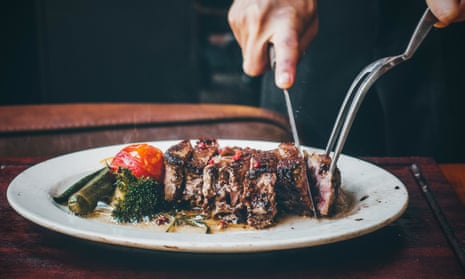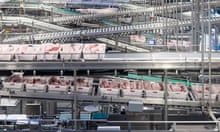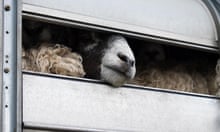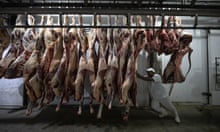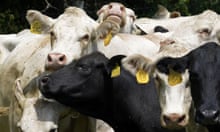A public statement signed by more than 1,000 scientists in support of meat production and consumption has numerous links to the livestock industry, the Guardian can reveal. The statement has been used to target top EU officials against environmental and health policies and has been endorsed by the EU agriculture commissioner.
The “Dublin Declaration of Scientists on the Societal Role of Livestock” says livestock “are too precious to society to become the victim of simplification, reductionism or zealotry” and calls for a “balanced view of the future of animal agriculture”. One of the authors of the declaration is an economist who called veganism an “eating disorder requiring psychological treatment”.
The declaration was published a year ago but gave no information on its provenance. Its supporters appear to be overwhelmingly researchers in animal, agricultural and food sciences.
Documents obtained by Unearthed, Greenpeace UK’s journalism project, and seen by the Guardian, show the creation, launch and promotion of the declaration have significant links to the livestock industry and its consultants.
The declaration and associated studies are viewed as “propaganda” by leading environmental scientists. Prof Matthew Hayek of New York University in the US said: “The scientific consensus is that we need rapid meat reduction in the regions that can afford that choice.”
Studies in the highest-ranking scientific journals have concluded that cutting meat and dairy consumption in rich countries is the single best way to reduce a person’s impact on the environment and that the climate crisis cannot be beaten without such cuts. People already eat more meat than health guidelines recommend in most developed nations.
The EU was pursuing policies to reduce meat consumption on environmental and health grounds, but some of these have recently been dropped.
‘Dietary comedy’
The Dublin Declaration was launched at a meeting hosted by the Irish government’s agriculture and food agency, Teagasc, in October 2022, with the summit costing €45,000. It claims “livestock-derived foods are the most readily available source of high-quality proteins” and that “well-managed livestock systems … can generate many other benefits, including carbon sequestration, improved soil health, biodiversity, watershed protection”.
It was supported in April by a special issue of an academic journal, Animal Frontiers, guest edited by Prof Dr Peer Ederer and Prof Dr Frederic Leroy. Both were part of a six-member organising committee that initiated the declaration.
Ederer runs the Global Food and Agribusiness Network (GFAN), a company that provides research and advice to clients in the meat and livestock sector. He said recently on social media that veganism was an “eating disorder requiring psychological treatment” and likened it to the Heaven’s Gate cult.
He has also criticised the “climate hysteric policies” of the EU and in 2020 gave a talk to the Global Warming Policy Foundation, the UK’s most high-profile climate sceptic group, in which he said “cows are not the reason for whatever climate change we have”.
Emails related to the declaration were released by Teagasc under freedom of information rules. In one, another member of the organising committee, Collette Kaster, the chief executive of the American Meat Science Association, described Ederer as the “primary author” of the declaration, although he denies this.
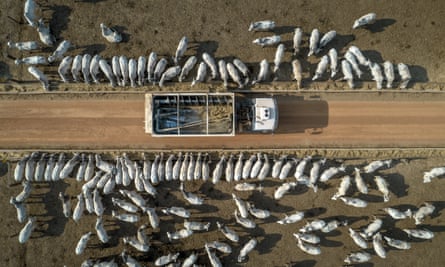
He said: “The authorship for the declaration lies with the entire group of 36 scientist co-authors who contributed to the scientific articles of the Animal Frontiers special edition.” A webpage describing the authorship appeared on the declaration website after Ederer was contacted by the Guardian. “We had not reported about our potential conflicts of interest as would be common in scientific practice, so we fixed this,” Ederer said.
“I have clients in the livestock sector,” Ederer said. “This emphasis on whether some researchers have customers from private industry is, in my view, and many people’s, completely meaningless, because there’s no such thing as conflict-of-interest free research.” He said no one was paid for their involvement in the Dublin meeting or declaration.
Leroy is a food scientist at Vrije Universiteit Brussels and president of the Belgian Association of Meat Science and Technology. He has called plant-based meat alternatives “dietary comedy”, suggested green campaigners “would secretly enjoy a savage apocalypse” and called politicians backing green policies “out-of-touch, virtue-signalling simpletons”.
The EU’s biggest farming lobby group, Copa Cogeca, says it “supports” a pro-livestock information initiative administered by Leroy and the documents show Leroy discussed the declaration with Copa Cogeca. Leroy did not respond to requests for comment.
Polish beef
The declaration shares some text and themes with a position paper prepared for the UN food systems summit in 2021 by dozens of groups, including nine private industry associations such as the International Meat Secretariat, International Poultry Council and the International Dairy Federation. Ederer said: “The private industry associations had minimal input into the document.”
An assistant director of Teagasc, Declan Troy, one of the Dublin organising committee, noted in an email that some of its members had “close ties” to the meat sector, “but then so does Teagasc”.
A spokesperson for Teagasc said: “Contracts with food companies outline that they will not have any influence over the publications of the outputs of the research or knowledge transfer programmes.” The American Meat Science Association (AMSA), represented by Kaster on the committee, is a professional society of meat scientists and supported financially by many of the world’s biggest meat producers.
The Dublin Declaration website is hosted by a meat industry research project called the International Meat Research G3 Foundation, which is registered to the same Warsaw address as the Polish Beef Association (PBA) and is chaired by the PBA’s president.
The declaration was publicly promoted by the Global Meat Alliance, an industry-funded group, and the PR agency Red Flag, which has worked for the North American Meat Institute and the US National Cattlemen’s Beef Association. Ederer said he did not know who paid Red Flag.
‘Fossil fuel playbook’
The declaration states that “the highest standards of … evidence underscore that the regular consumption of meat, dairy and eggs, as part of a well-balanced diet, is advantageous for human beings” and that “drastic reductions of livestock numbers could actually incur environmental problems on a large scale”.
As evidence, the declaration points to seven papers published in the special issue of Animal Frontiers in April 2023. The publication is the “official journal” of the World Association for Animal Production (WAAP) and four animal science societies, which fund it. These include AMSA, with Kaster serving on the management board of the journal. WAAP also states that “industry representatives are involved in its activities”.
The journal’s content was delivered by Ederer and Leroy as guest editors. Ederer said he considered the special issue to be the work of all six members of the Dublin organising committee.
Prof Peter Smith of the University of Aberdeen, UK, a lead author on eight reports by the authoritative Intergovernmental Panel on Climate Change, said: “The Dublin Declaration reads more like livestock industry propaganda than science. It makes a mockery of independent, objective science publishing. This is not about stifling debate – it is about protecting scientific integrity.”
after newsletter promotion
Smith viewed the declaration and the Animal Frontiers studies as extremely poor, selective science and he is working with other experts on a comprehensive rebuttal. For example, he asserted that they overgeneralise evidence that applies to a very small fraction of global livestock and fail to acknowledge the serious and acute public health and environmental harms of livestock.
Hayek said: “It is clear from the past two decades of independent, peer-reviewed evidence that business-as-usual meat production and consumption is unsustainable and growing.”
He added: “Scientific consensus can and should always be challenged, but doing so requires strong, novel, and large amounts of high-quality evidence. The Animal Frontiers issue does not accomplish that.” In Hayek’s view, many of the articles are “just slanted reviews that rehash and re-adjudicate old debates”.
Prof Jennifer Jacquet of the University of Miami, US, said: “The Dublin Declaration is another instance of the livestock industry taking a page out of the fossil fuel playbook to fight action on climate change. It tries to leverage the academic profession and its institutions to downplay the role of livestock in climate change.”
A statement from the management board of Animal Frontiers said: “Animal Frontiers publishes discussion and position papers that present international perspectives on the status of high-impact, global issues in animal agriculture. The journal requires all authors to disclose any potential conflict of interest at the point of submission.”
Leroy and Ederer published a letter in the journal Nature Food in June 2023 decrying “hyperbolic arguments” against meat production and consumption and highlighting the Dublin Declaration and Animal Frontiers papers.
A recent response in the same journal by 16 scientists said the letter “contains unsubstantiated generalisations and statements” and “overlooked and downplayed research demonstrating the incompatibility of current and projected levels of consumption of animal products with the imperatives of bringing humanity’s economy within the planetary biophysical limits”.
Winking face emoji
The Dublin Declaration has been used to try to influence senior EU officials. Ederer and others presented the messages in the declaration at a PBA meeting in Warsaw in January 2023, which was attended by Janusz Wojciechowski, the EU’s agricultural commissioner, and his officials. Wojciechowski had already endorsed the declaration on social media in October, calling it “a very valuable contribution to the ongoing debates in the EU”.
A blog post from the Global Meat Alliance (GMA) about the meeting said: “Ensuring that the evidence presented at the Dublin summit is visible to the European commissioner is of huge significance.” Ederer told the GMA that the meeting had “proved fruitful”. The blog post’s author said they had watched the meeting via Zoom “with a glass of wine in hand and a rather large steak”.

Shortly after the Warsaw meeting, Ederer wrote to Leroy, Troy and the rest of the organising committee: “I spoke with the head of cabinet of the commissioner and his press coordinator. They both said that the Dublin summit and the Dublin Declaration was the first piece of utilisable science they have received in all their four years of commission work. They are more than enthusiastic about our clarity and depth of scientific evidence and relevance that we pulled together. They will support us with any other event we want to organise, especially if we do something in Brussels. We are on the right track.”
In April, there was an event in Brussels promoting the declaration, hosted by the industry-backed group Animal Task Force (ATF). Leroy wrote of the event: “We’re specifically targeting the Brussels EU bubble.”
In email discussions before the meeting, Leroy suggested involving ATF on the basis that it was a “network of scientists”. Ana Granados Chapatte, an ATF vice-president representing industry bodies, backed the suggestion, saying it would help the event “remain a scientific initiative … far from the use of science that the private sector or NGOs can do for their own interest … even if ATF is also the private sector”, ending the sentence with a winking face emoji.
Chapatte told the Guardian: “ATF is a partnership that brings together public research and the private sector to define research and innovation priorities for European Commission research programmes aimed at enhancing livestock sector sustainability, with a focus on Brussels’ EU policymakers and stakeholders.”
Indefinite delay
In November 2022, the EU’s leading agrifood lobby groups wrote to Wojciechowski using the Dublin Declaration to argue against a plan to end public funding for the promotion of red meat. The EU has spent hundreds of millions of euros advertising meat and dairy products but the plan to end the funding is deadlocked in Brussels.
The declaration was also highlighted to the European Commission’s group of chief scientific advisers as it produced its advice on moving “towards sustainable food consumption”.
The EU’s sustainable food systems legislation was expected to be published in September but has since been dropped. “It’s clear that this commission, when it comes to food and farming, started with a very high level of commitment, at least in words, but it has ended up with basically nothing,” said Marco Contiero, Greenpeace’s EU policy director on agriculture.
Olga Kikou of the campaign group Compassion in World Farming said: “The commission seems to have undertaken a U-turn in its promised reform of the EU agriculture policy. It is clear that more transparency is needed on how tools such as the Dublin Declaration are used.”
Contiero said: “Opposing the necessary reduction in livestock production and consumption means supporting vast amounts of deforestation, huge loss of biodiversity and a guaranteed end to a stable climate.”
